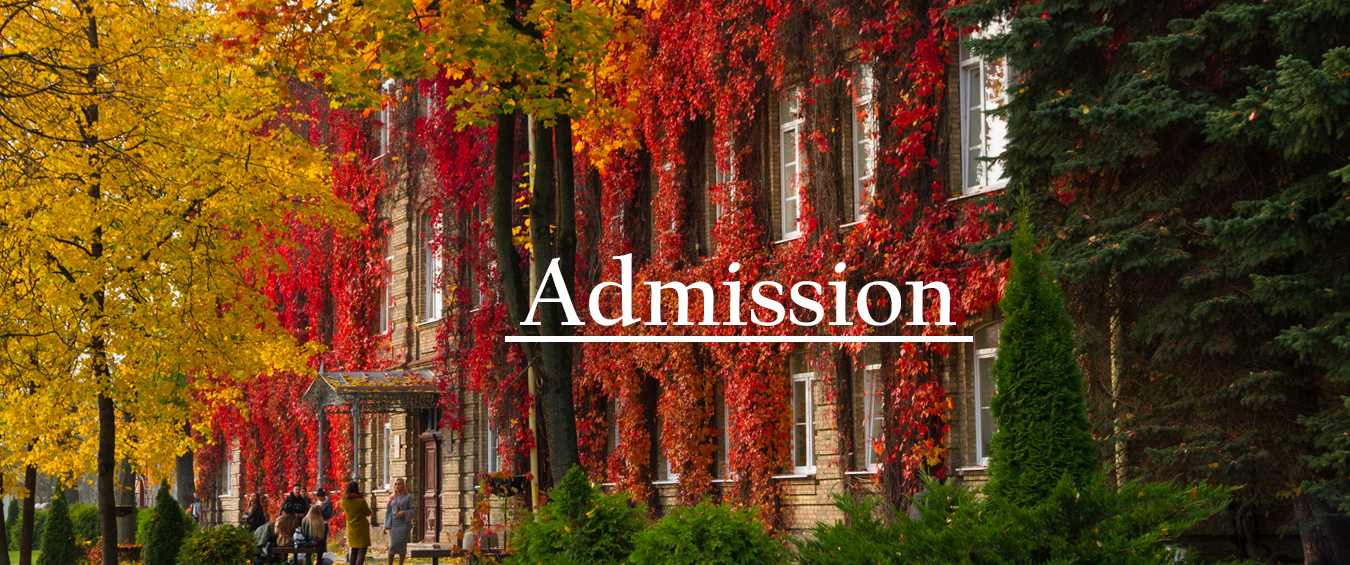
Yanka Kupala
State University of Grodno
YKSUG transferred funds to the account of Vasilishki house-boarding school
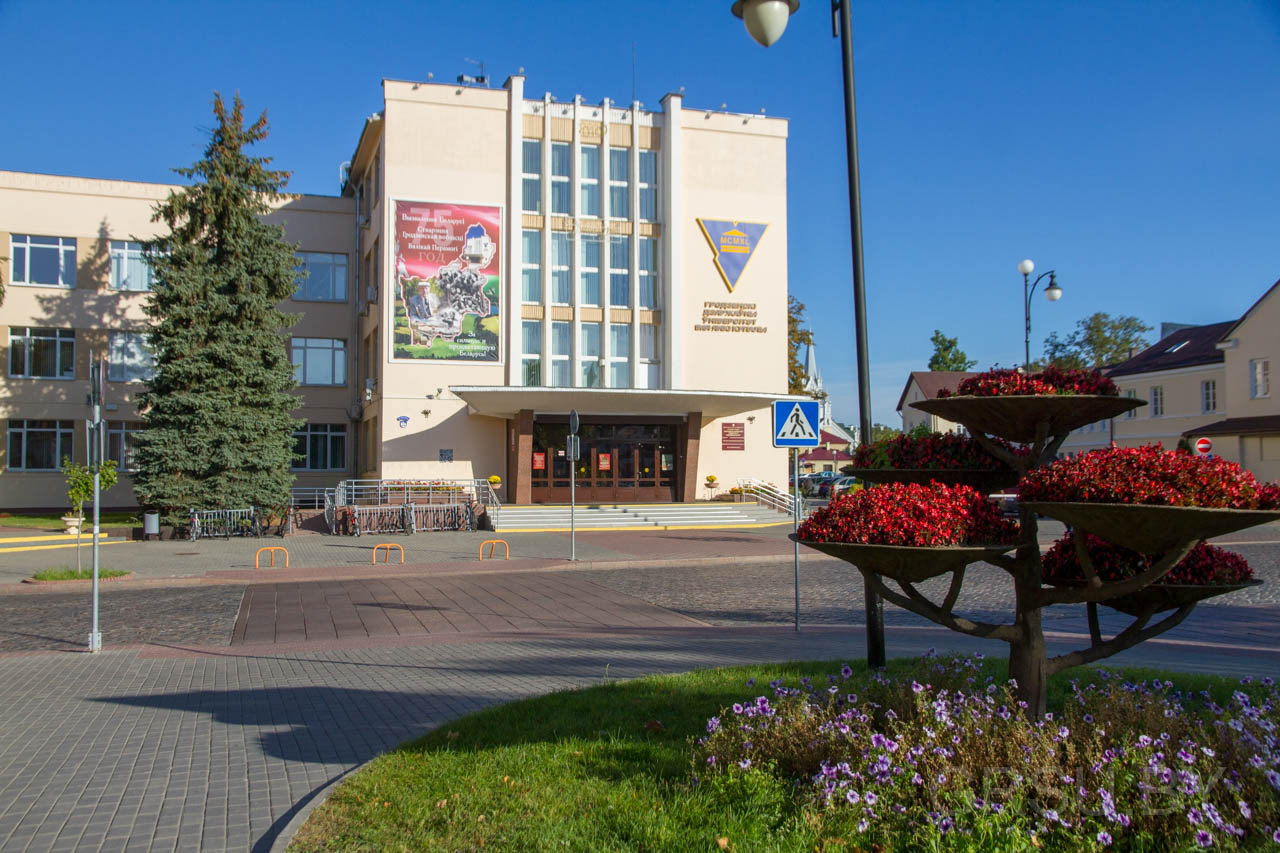
The transfer of 1 thousand rubles took place as part of the celebration of the International Children's Day.
157 children live in Vasilishki boarding house, receive treatment and care, as well as attend classes and learn the skills necessary for successful social adaptation. Representatives of Yanka Kupala State University are members of the Board of Trustees of this institution and regularly hold charity events for children – Kupala residents have been fulfilling the wishes of students of Vasilishki boarding house since 2016.
Every year, volunteer students and teachers visit Vasilishki boarding school for children with disabilities and special psychophysical development, participate and hold festive events there, and organize actions in the city and the university aimed at helping the children of the boarding house.
Traditionally, before the New Year in the framework of the "Our children" campaign and on the International Children's Day, the management, employees and volunteers congratulate the children, spend time with them, give gifts and their attention. In addition, the faculties of Yanka Kupala State University host charity fairs and events, the funds collected from which are transferred to the boarding house.
State awards were awarded to the representatives of Yanka Kupala State University Yury Bialykh nand Yevgeny Rovba
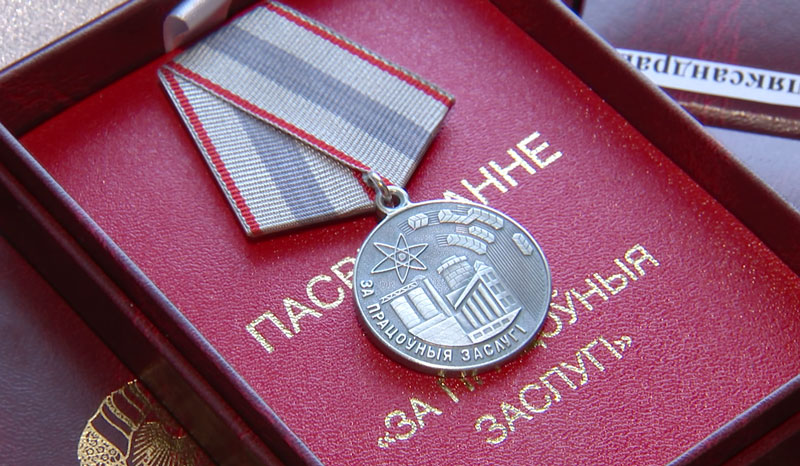
By decree of the President of Belarus Alexander Lukashenko, awards were awarded to representatives of various spheres of activity of the country.
Decree No. 191 approved the decision to award orders, medals and honorary titles for long-term fruitful work, exemplary performance of official duties, exceptional bravery and courage shown in the fight against crime and in saving people during a fire, significant contribution to the implementation of justice and ensuring the rule of law, the development of railway transport, engineering, publishing and printing, services in the field of agriculture, construction, social protection, trade, science, education, art and culture.
Yury Bialykh, Vice-rector for Academic Affairs of Yanka Kupala Grodno State University, was awarded the medal "For labor merits". Honorary titles were also awarded by the decree of the President of the Republic of Belarus. Thus, the head of the Department of Fundamental and Applied Mathematics of Yanka Kupala State University Yevgeny Rovba was awarded the title "Honored worker of education of the Republic of Belarus".
The summer examination session has started at Kupala University
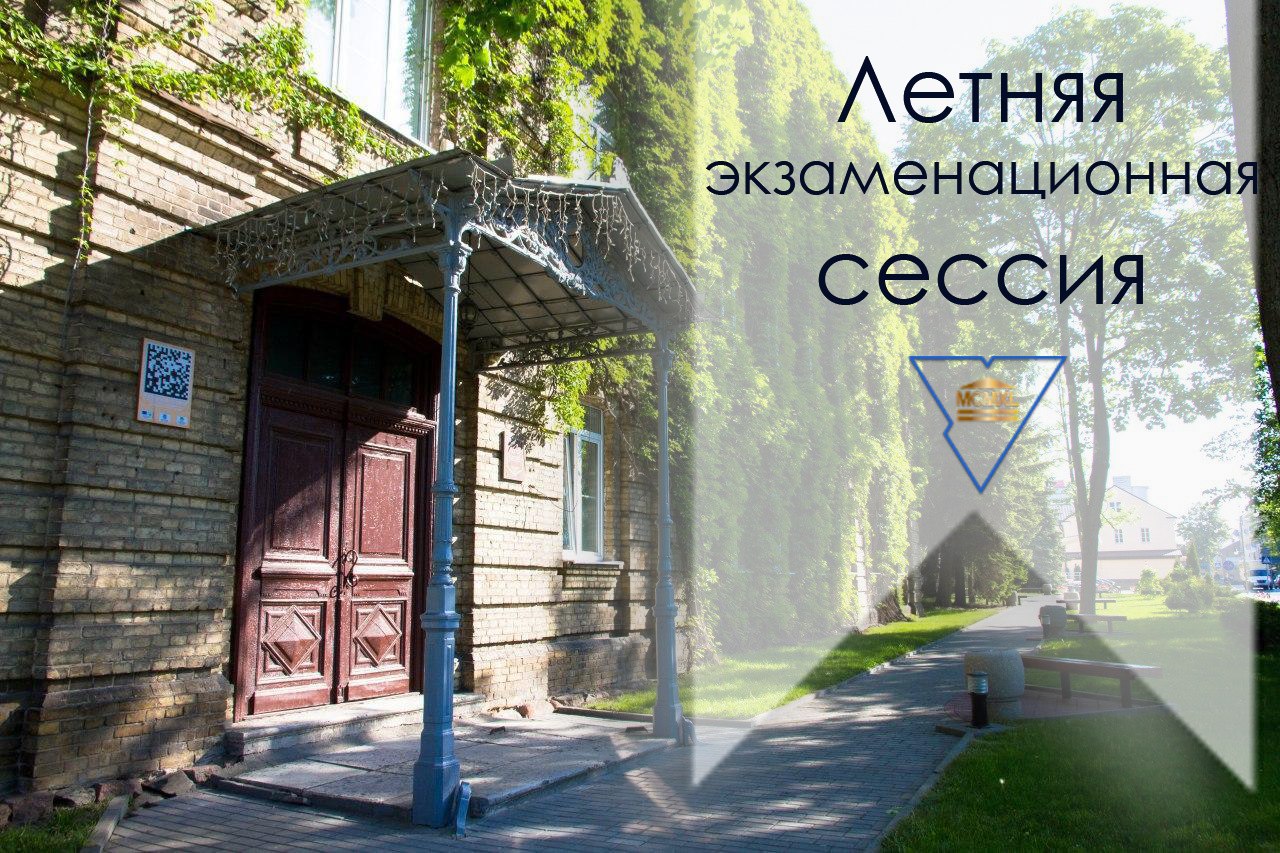
Exams are conducted in person, mainly in writing, in the University's classrooms. All necessary sanitary and epidemiological requirements are met.
Thus, when drawing up the schedule, the need for sanitary treatment of classrooms and minimizing the number of students who are simultaneously in the buildings is taken into account.
In addition, the number of seats in the classrooms where exams are held exceeds the number of students in the group by at least twice. If necessary, the groups are divided into subgroups, for which the exam is held on the same day, but at different times. Sanitary and epidemiological requirements are met: a distance of at least 1.5 meters, the use of personal protective equipment – masks and gloves.
It should be noted that students who are on self-isolation, in the presence of a supporting document on an individual basis on their application, are given the opportunity to pass the exam using information and communication technologies with mandatory visualization. The exam with the use of ICT is conducted in oral form with video recording. If there is a disability sheet, the student's current certification is postponed to September.
The summer examination session for full-time and evening students will end on June 17. On June 18, state examinations and defense of theses and master's theses will begin. For part-time students, exams and tests have been postponed to September
Studios, chatbots and mobile apps: Yanka Kupala State University has completed the submission of applications for the IV Open competition of student startup projects "Innastart”

25 projects of Kupala students take part in the competition based on the results of the first rounds.
In order to develop a project idea and business model of the project, participants attended preparatory trainings during the first stage. At the master classes, Kupala students learned how to select a team and present their work, understood financing, marketing and possible risks. After the training seminars, the students drew up ideas and submitted applications. A total of 25 teams participate in the competition based on the results of two rounds. Contestants offer ideas for different spheres of life: mobile apps, chatbots, educational projects. There are also innovative technological solutions among the ideas. For example, parking lots using solar energy for electric vehicles.
Registered projects will be evaluated by the jury until June 3. We will take into account the innovative nature of the project, its relevance, feasibility in practice and the availability of a sound business model. Innastart will end with the final stage of Startup battle. The finalists will present their projects, take part in master classes, and will be able to consult with expert entrepreneurs.
The contest jury will select the best student projects in four categories according to priority directions of scientific researches and scientific-technical activity in the Republic of Belarus: "The best start-up – TECHNOLOGY", "Best start-up project – PRODUCT", "Best start-up project – SERVICE", "Best startup project-SOCIAL INNOVATION".
The winners and prize-winners of the IV Open competition of student startup projects "Innastart" will receive prizes, a certificate for free consulting in Yanka Kupala State University Science and Technology Park, and the opportunity to use its infrastructure and services.
The organizers also note that the competition results can determine the best project – a candidate for the Grand Prix in the form of a grant to create a startup-resident of the science and Technology Park with the amount and sources of funding determined on the basis of a reasonable business plan in accordance with the established procedure.
Housewarming is getting closer: finishing works are being actively carried out in the new dormitory of Yanka Kupala State University
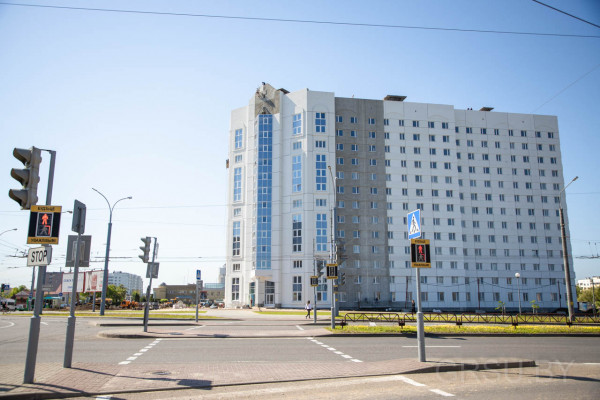
The dormitory of YKSUG on Dubko street is planned to be put into operation in 2020.
We remind that the construction of a new dormitory of Yanka Kupala State University on Dubko street began in March 2019. After the new building is put into operation, the number of students provided with dormitories will reach more than 85%. A modern 13-storey dormitory will open its doors to 1030 residents of Kupala university. The first floor will house the premises of the administrative and economic service, a buffet, and a medical unit. In total, the dormitory will have 168 three-room residential blocks, with two people in each room. Each unit has a kitchen equipped with necessary appliances and furniture, a bathroom and a shower. On the territory of the dormitory there will be a sports ground, fields for basketball, mini-football and hockey.
Commissioning of a new dormitory on Dubko street will meet the housing needs of the majority of nonresident students in need, and will also help to increase the export of educational services of Yanka Kupala State University.
New virus protection devices for doctors and the public are being developed at Yanka Kupala State University of Science and Technology Park
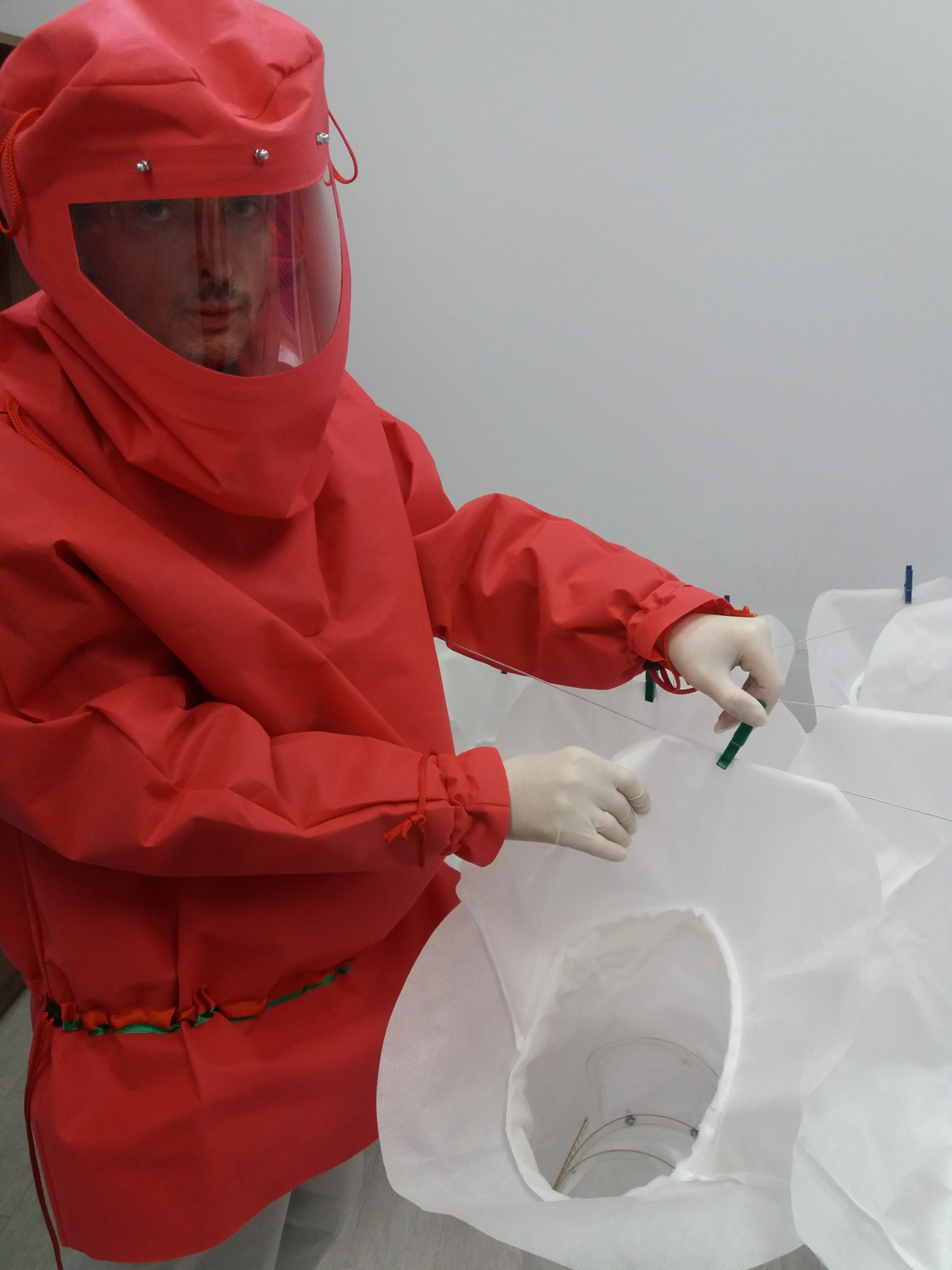
The team of resident company of Technopark, LLC "LIRAandCo" developed its own strategy against the proliferation of coronavirus.
At this stage, all the efforts of the company's representatives are aimed at providing the necessary means of protection to the region's doctors.
– We have studied how they work very carefully, in what conditions they work, what means of protection they need, and we offered our solutions, - the head of the company Pavel Krivenko said. – So, we suggested that doctors use contactless filters as protection instead of standard respirators, which perform their task no less effectively, but are more convenient. Our company has already manufactured and delivered more than 300 contactless filters to medical institutions in the region, as well as about 200 protective suits for doctors. I must say that we have developed and implemented all this in just two weeks and are now continuing to work on finding new solutions.
In the near future, LLC "LIRAandCo" plans to significantly increase the production of protective equipment for doctors and produce about 100 closed suits and 200 contactless filters every day to meet the existing needs of medical institutions in the region. In addition, representatives of the resident company of Yanka Kupala State University Science and Technology Park are constantly working to find new solutions that will help improve the efficiency of contactless filters and closed suits, as well as develop and gradually introduce new protection devices for doctors and the public.
– We try to rationally use the supplies available to us, so, first of all, we are focused on fulfilling the requests of doctors, - Pavel Krivenko said. – But we are already ready to offer some interesting solutions for the population. For example, we produce a keychain with the function of a hand – a simple device that allows you to open a door without touching it with your hand, or press a button in an elevator, dial a code in an ATM.
At the moment, representatives of the company are introducing another invention into production – an air blower. It is a device for flow filtration of air from physical and biological particles, which feeds the purified gas mixture under pressure both to the contactless filter or suit, and to the premises. Developers are also thinking about improving the protective suit, namely, how to make the suit not only protect the doctor from infection, but also to make it comfortable to work for many hours.
Representatives of the company note that they keep in touch with all medical institutions in the region, continue to study their requests, which change depending on how the situation with the spread of coronavirus in the country develops. And according to this information, they make certain adjustments to their devices and developments every day. Yesterday's decisions may no longer be relevant today. But thanks to the powerful material and technical base of the Technopark, the creative teams of resident companies have the opportunity to make decisions quickly and work effectively.
The group of the primary organization of GRSU BRYU on VK is among the best in Belarus

The winners of the "BRYU-2020 Internet award" have been named.
The award has become a kind of annual marathon with the selection of the most prominent official and online resources of the Youth Union on a competitive basis. This year, the final event of the project was held online on the sites of the Youth Union on the social network "Vkontakte", as well as on the brsm 2.0 channel of the video hosting YouTube. This year the number of applications for the competition has doubled to 150.
According to the results of the contest, the groups of primary organizations of YKSUG BRYU, Lida secondary school No. 15, Grodno State Agrarian University, Moscow (Minsk) and Pervomaisk (Bobruisk) district committees, as well as the Vitebsk Regional Committee of the Youth Union were recognized as the best on Vkontakte.
The best Instagram account for a primary organization with the rights of the District Committee of Belarusian National Technical University, Kobrin District Committee, and Vitebsk Regional Committee of the BRYU.
Valeria Milovanova, the second Secretary of the Gomel city Committee of the BRYU, was awarded the award "For following the trends of social networks". By the way, this time she became the host of the ceremony and the only winner who received the award in real time.
– Today we would like to thank all the guys who are actively developing their accounts on social networks. Professional blogging is hard everyday work. But there is a specific indicator of the success of your work – subscribers. Therefore, we must always be in the trend here – First Secretary of the BRYU Central Committee Dmitry Voronyuk said during the final event. – The main thing is not to be afraid and do something new. Today we are testing new forms of work on the Internet, testing projects and developing the most interesting ones.
Award winners will receive branded statuettes and diplomas. The awards will be delivered to them by mail. The organizers also provided incentive diplomas that mark active groups of the Youth Union in social networks.
Yanka Kupala State University presented the Corporate Code of the University
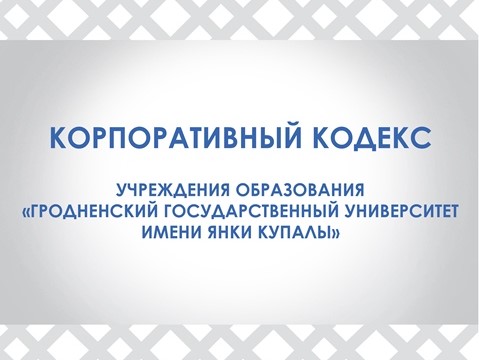
The development of the Corporate Code was implemented as part of the personnel policy of Kupala University for 2018-2020.
The corporate code of the educational institution "Yanka Kupala Grodno State University" is a local legal act that defines corporate values and rules of conduct for all members of the collective.
"The Corporate Code of the University is an opportunity to define corporate traditions and values, define our rules and principles, and unite the interests of all members of the Kupala team," Galina Sakomskaya, head of the center for human resources and legal work said. – Despite the fact that for the development a working group was created, all employees and students can participate in the discussion of the document. The Corporate Code is a desire and desire to support the positive image of Kupala University and every Kupala citizen, this is our business card.
The main purpose of the code is to define corporate values, norms and rules of conduct that contribute to the implementation of the Mission, Vision, Quality Policy, Strategy of the University and other documents that define its activities. The goals also include the development and strengthening of corporate culture, maintaining the spirit of unity and mutual respect in the team, and increasing the responsibility of team members for the results of their activities and the activities of the University on the whole.
The document consists of six sections. The first section of the code reveals the General provisions and goals of the code, as well as introduces the main terms. The section "Corporate symbols and traditions of the University" describes the corporate colors, logo, flag and anthem, reveals the system of motivation, as well as forms of moral incentives and incentives, corporate insignia and significant events for Kupala University. You can learn about the key corporate values of Yanka Kupala State University and the principles of corporate management in the third section, and about the basic rules of corporate behavior in the fourth section. The fifth section informs representatives of YKSUG on corporate communications and media relations. The brand name (logo) of the educational institution, the anthem, the flag, as well as a description and illustrations of academic clothing can be found in the appendices to the Code.
Yanka Kupala State University celebrated the Day of the State Emblem and National Flag of the Republic of Belarus
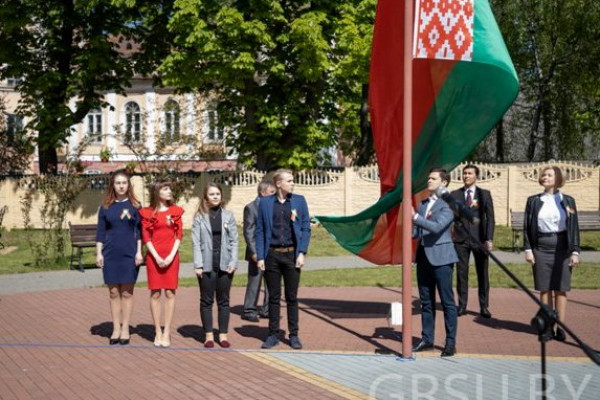
The solemn event in the framework of the regional campaign "Symbol of pride and glory" took place in the "heart" of Kupala University – on the University Flag Square on May, 10.
Irina Kiturko, the rector of Yanka Kupala State University, welcomed and congratulated the participants of the event – employees and students of the university.
– The coat of arms, flag and anthem represent the independence of our country. I sincerely congratulate all of us on this holiday and am very proud that we are the only university in Grodno that has such a wonderful and unique place – the University Flag Square. For Kupala University, today's action means the birth of a new tradition.
Irina Kiturko stressed the symbolism of the fact that this year the Day of The State Emblem and National Flag of the Republic of Belarus is celebrated during the celebration of the Sacred date – the 75th anniversary of the great Victory over the Nazi invaders.
On behalf of the students on this day, a representative of the pedagogical faculty, Tatyana Shcherbach, spoke with words of congratulations. She noted that it is very important for the younger generation to remember the history of their people, their country and family, as well as pass it on to their children.
The best students, teachers and employees of the University who glorify Yanka Kupala State University in Belarus and far beyond its borders with their high achievements in the field of science, culture and education were awarded the honorary right to take out and raise the national flag of the Republic of Belarus. In 2020 among them were a senior lecturer in international law, Law Faculty, the winner in the nomination "Teacher without a degree" according to the rating of the faculty Elena Korneva, associate professor of General Physics of Physical-Technical Faculty, who took the second place in nomination "Young scientist" according to the rating of the faculty Andrew Lavysh, Chairman of the Public Association of Veterans of Labor at Yanka Kupala State University of Grodno, Alexander Kudel, PhD in physics and mathematics, a recipient of the presidential scholarship of the Republic of Belarus Svetlana Gogoleva. Also there were Chairman of the Student Council of the Pedagogical Faculty Ekaterina Gannutsina, the Chairman of the Fraternities of Foreign Students, a student of Law Faculty, Rovshen Sultanov, a student of the Faculty of History, Communication and Tourism, a participant in the Republican campaign "For the glory of the common Victory" Vladislav Mandik and a member of the staff of Labor Affairs, Deputy Chairman of the volunteer organization of students of Yanka Kupala State University Olga Rusilko.
The action culminated in the raising of the flag of the Republic of Belarus on the University Flag Square, after which each participant released balloons into the sky dyed in the color of the state symbols.
More...
Yanka Kupala State University of Grodno gave 500 holders for protective masks to the doctors of Grodno City Clinical Emergency Hospital
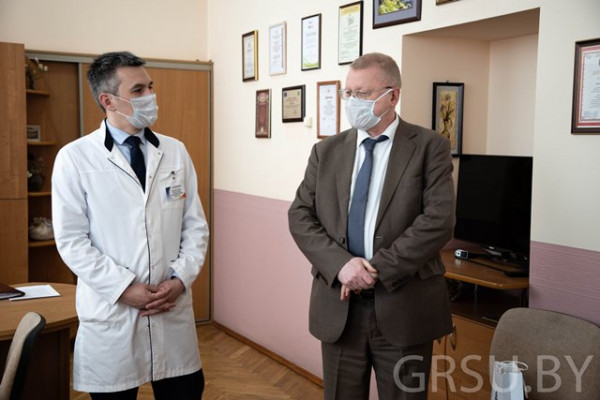
A special device that makes it easier to wear a medical mask is being created at Yanka Kupala State University Technopark.
Employees of the Science and Technology Park use laser cutting technology to create holders for comfortable wearing of medical masks that reduce the pressure on the ears from elastic bands. The device is a plastic strip with holders to which you can attach the elastic bands of the mask.
This is not the first time Kupala University has helped medical professionals. Yanka Kupala State University Technopark produces universal protective screens every day using laser cutting and 3D printing technologies, as well as produces personal protective equipment for medical professionals. More than 1,500 security screens have already been implemented. One hundred protective screens for doctors, purchased at the expense of trade unions of employees and students of Yanka Kupala State University, were sent to medical institutions of the regional center. Along with protective screens, trade union activists – employees and students of Yanka Kupala State University – handed over sprayers for hand sanitization to medical institutions in Grodno. In addition, Kupala University gave the Grodno Regional Ambulance Station a certificate in the amount of 3,000 rubles.
THE NEWSPAPER "GRODNO UNIVERSITY" - WINNER OF THE XVI NATIONAL COMPETITION OF PRINTED MEDIA "GOLDEN LETTER" (UPDATED)
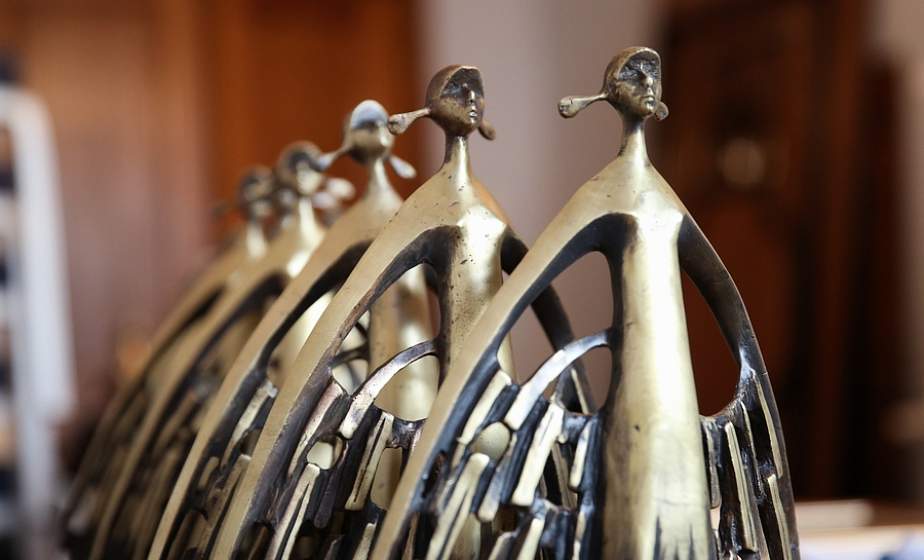
The main intrigue of the annual competition between the print media of Belarus was resolved on May 6. The names of the winners and laureates of the competition were announced.
Among district, city, corporate and multi-circulation print media, the monthly newspaper of Yanka Kupala Grodno State University won in the category "Best materials of scientific, popular science topics" based on the results of its work in 2019.
The total of 400 applications from periodicals, news agencies and personalities were submitted for the contest. There are 269 regional media from 81 editorial offices, 108 national media applications from 31 editorial offices, and 23 from corporate media among them. It is gratifying that the jury noted not only the activity of print media and online publications, but also the high level of submitted works.
The newspaper "Grodno university" confidently competes with regional, city, corporate and multi-circulation print media – for the first time it received an award in the same category in 2017.
The main goal of the contest is to promote the development of print media in Belarus in every possible way, to update important thematic areas of print media activities in the implementation of the state information policy, to improve the professional and ideological content level of print media, to stimulate the creative activity of journalists and other creative workers involved in the production of print media.
The ceremony of awarding the winners of the competition and awarding diplomas and commemorative signs will be held within the framework of the international specialized exhibition ”Mass media in Belarus“.
The full list of winners and laureates can be found here. https://grodnonews.by/news/zhizn/podvedeny_itogi_xvi_natsionalnogo_konkursa_zolotaya_litera.html
The joint project of the University of Wisconsin in Parkside and the Yanka Kupala State University of Grodno “United University” will start in the fall of 2020
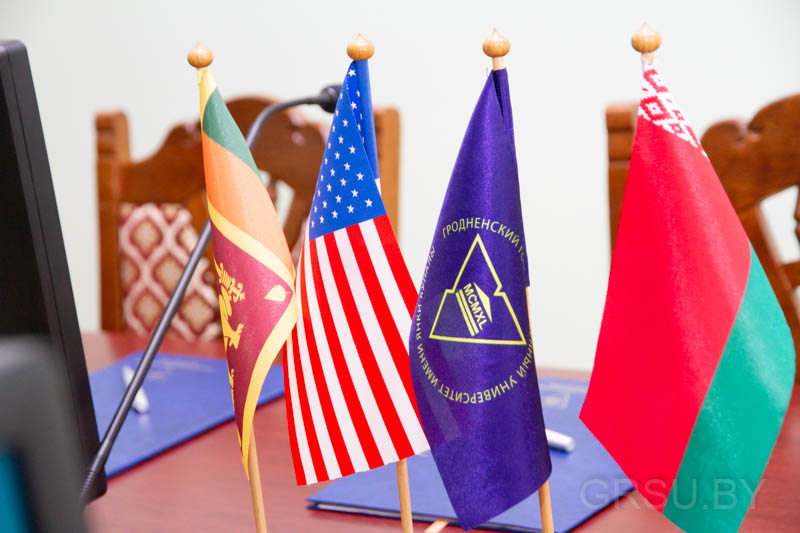
The project plans to recruit students for joint educational programs in English in physics, psychology and mathematics.
The project "United University" includes the training of foreign citizens at the Yanka Kupala State University of Grodno and at the University of Wisconsin in Parkside according to the 2 + 2 scheme. After studying at the Yanka Kupala State University of Grodno for two years, students will be able to complete their studies at the University of Wisconsin in Parkside or continue at the Yanka Kupala State University of Grodno.
The project will be implemented within the framework of the memorandum of understanding between the two universities, which was signed in July 2019.
The project partner is the AIC Campus of the Democratic Socialist Republic of Sri Lanka.
Registration continues for the 17th Grodno Invest Weekend and Expert Day
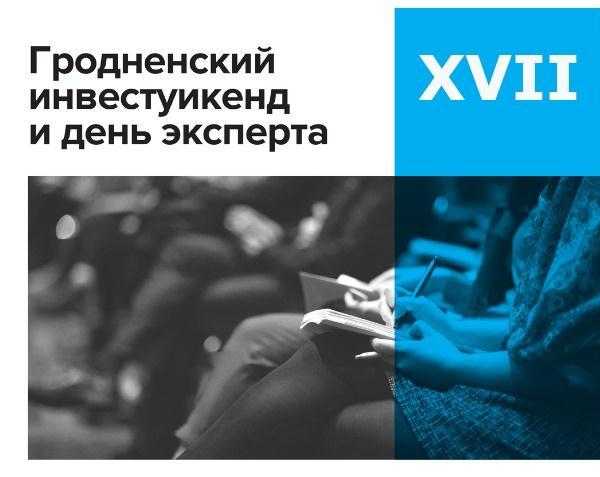
Initiative students, as well as anyone who wants to realize a creative business idea, can send an application for participation until May 16.
Invest Weekend and Expert Day is a non-profit event, a business forum in which businessmen, start-ups, students, experts, and investors are starting and taking place at the same time. This year the event in Grodno will be held online in two stages.
Until mid-May, applications will continue to be accepted, among which the best will be determined later. When filling out an application, the event organizers recommend a detailed description of the solution to the problem identified in the business project, an assessment of the competitive environment, a target audience for the project, a way to monetize a business idea, indicate estimated costs and profits, determine potential market size and describe the competencies of a business team.
The authors of the projects selected at the first stage before May 24 will be able to finalize the presentations. The second stage of the event - an open vote - will be held from May 25 to May 31. Summing up the competition is scheduled for June 3, 2020. In determining the winners will be taken into account as judges and the results of an open vote.
Invest Weekend and Expert Day is a unique opportunity to present your projects to professionals, get useful recommendations and quality feedback. All details about the event can be found at https://grodno.startup-school.by/inwestweekend17. You can also apply for additional information by calling 62 16 30 or +375 44 5926221.
